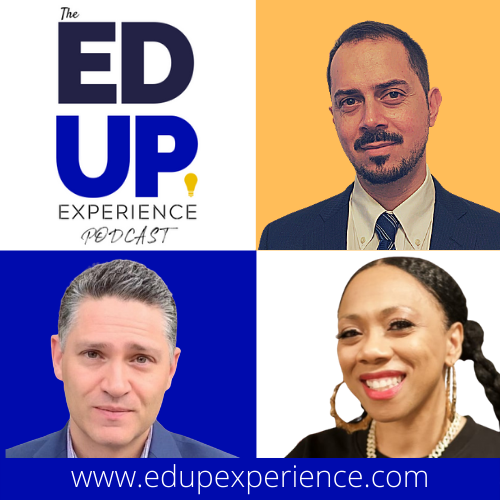Published on
Personalized Learning Experience at Scale

Higher education has been set in its traditional ways for decades, and with digital innovation at the forefront of everyone’s lives, it’s critical to be more digitally engaged with your students. Personalization at scale is necessary to thrive in this new market. In this interview, Dr. Joe Sallustio and Liz Leiba speak with Marni Baker-Stein about the importance of student-centricity, growing retention rates and what it takes to thrive in a post-pandemic world.
EdUp Experience: Can you talk about Western Governor University’s infrastructure underneath the academic oversight, so we can get a sense of your influence in general?
Marni Baker-Stein (MBS): Well, WGU is large—we’re serving over 135,000 full-time students. And they are all online, nationwide. In my role as Provost and Chief Academic Officer, all of our four colleges report up to me, so I lead those colleges and all of the close-in services that encompass WGU.
That includes our program design and development team doing end-to-end design and developing competency-based programs, the learning experience and all of our assessments. People may not know that WGU is a master curriculum institution. We create our curriculum end-to-end and our assessments against competencies. As our faculty are teaching this curriculum, we’re running data through it and to continuously improve it.
EdUp Experience: How do you keep yourself focused and identify the issues that need to be tackled in a large organization?
MBS: That’s an evolution in leadership. I feel like I’m still on that journey with everyone else. The WGU team is comprised of some of the most creative, powerful, focused, professionals in higher ed.
My primary job is to make sure I’m architecting an environment where they feel safe to innovate, safe to learn, and where they can be accountable for it. We want to make sure we’re focused on student transformation and optimizing everyone’s path toward their dreams. That is a big responsibility to carry, and we take it very seriously.
We have identified for ourselves, within our metrics and our culture, three big key results. The first is a focus on scale, so we can personalize the experience for the student. They need to feel like it’s just for them, and we can do that in a way that not only helps them to be successful but ensures we are as affordable as possible.
Second, we want to make sure every program we offer has a graduate return for students. So, if they’re spending money and time on a program, there is a return on that investment that we can stand behind.
The third and most important thing we’re laser-focused on access and attainment for low-income students and students of color. Everything we’re doing, every service, every piece of technology, every program needs to intersect integrity, value and equity for our diverse learner populations.
EdUp Experience: Can you tell us about your philosophy and how it has evolved over the time that WGU has been such a trailblazer in the space?
MBS: Competency-based education can be a big mystery for a lot of folks. Essentially, when we create a program, we start by creating a skills map based on dynamic skills data and a competency map, including knowledge, skills, abilities, dispositions tagged to those skills. And that becomes our playlist of competencies that create that program end to end.
We then package those competencies in different courses, and we relate those courses to credit that other universities are offering for similar courses. But essentially the student journey is moving through this playlist of competencies.
The most special and unique thing about WGU is when you start your six-month term, you can move as quickly or as slowly through those competencies as you need to.
EdUp Experience: Can you talk about retention and your focus on a students’ return on investment when it comes to work-ready skills?
MBS: What we’re really seeing with the new traditional student is they aren’t just adult working professionals—they are 18-year-old working professionals. They are kids just getting out of school and having to work full-time while they are on their first degree experience. Whether they are 18 or 50, they experience a lot of the same problems in juggling busy lives and schedules with school.
We’re particularly committed to understanding how we can significantly move the dial for low-income students and students of color and their intersections. That is really critical to us. We have a flexible model that provides a longitudinal mentor for students. We have course instructors for every class. We have just-in-time targeted feedback on all assessments. It’s a rich, flexible learning environment.
But the other thing we’re really committed to is seeing student persistence. We can see the drivers, the interventions and the curriculum in our system and how they impact a specific learner. We can then learn as a system how to better serve that learner and other learners like that learner. That is a huge part of what we do.
Part of the promise of the digital transformation of education is that even though it seems like, “Oh, it’s all scale, and it’s all big,” It provides us with the ability to really see students and understand when they’re hitting friction and then help them in that moment to get past it to gain confidence and take the next step. Our ability to do that through technology. Online is incredibly powerful to drive equity, access and educational attainment.
EdUp Experience: Can you talk about your philosophy as far as student success?
MBS: I’ve always talked about the importance of a community of care in higher education. You’ve got your faculty, TAs, advisors and others. And that there is a “community of care”, but it’s not very coordinated. And these people don’t necessarily feel like a team on most traditional campuses.
At WGU, our community of care is a team, so they circle around students as cases. Each student has a longitudinal mentor. It’s important to have somebody with you from day one of your program, to plan that program out against your career goals, your life goals. Then, as you’re moving through the program, they help you adjust that programming plan or those goals, which is critical for our students.
EdUp Experience: There’s still some confusion around a post-COVID world. What does that mean for your programs, your offerings and how you’re integrating with employers for the future of work?
MBS: We have always been committed to aligning our competencies with employer demand. And we used to do that through these hordes of subject matter experts. Just before COVID, we decided that while that was an incredible commitment for us, it really wasn’t good enough. We couldn’t see real-time employer demand for our competencies or programs in the today, despite what the trend data for that employment outcome looked like two or five years from now.
So, we put together our achievement architecture or skills architecture team. Now we have a skills map with dynamic employer data associated with it that can be geo-located to the zip code level. We have 13,000 skills in our map, and each is tagged to some high-level intelligence about employer demand, different sectors, different job titles. And that map is what we use to create new programs, but we’re tagging those skills now to our existing programs.
We can do a marketability scan of our programs based on that data on a dynamic basis, and that’s what we’ve committed to. WGU started the open skills network—educational institutions and big employers all coming together around this work of creating these skills and competencies maps.
This powerful, dynamic intersection between workforce gaps and workforce needs now into the future, and what education provides to students, have never been more important than they are today.
EdUp Experience: How do we as a sector do a better job of preparing the student for the job market?
MBS: We’re realizing that the world is changing, and it’s changing quickly. We have to prepare our learners to go out there and be able to get a job and jump right in. We just haven’t been as responsive. How do we balance that responsiveness with workplace needs and emerging technology, as the country shifts and changes.
I am hopeful that COVID will give traditional institutions a nudge to wake up and understand why they exist and what their mission should be for students. The whole idea is to tag learning outcomes, course outcomes, program outcomes to skills or marketable skills or some value measure of post-graduation impact. But there’s a protected interest around in doing that in many educational institutions.
That protected interest is tied up in the way those institutions are organized, the way curriculum, assessment, value and credentialing are governed. And it’s going to be slow to change. It’s going to be hard for those institutions to drive change. But let’s be clear, as I say this, there are so many institutions out there like, “Okay, it’s hard, but we’re moving beyond this. And we are going to create a learner-centered education system for the future, future, future.” And they’re making great strides. And the institutions that move in that direction will be the winners.
EdUp Experience: Is there anything you’d like to add about what the future of higher education will look like?
MBS: Many find WGU a little bit of an enigma, and I just encourage people, institutions, leaders, others—if you’re interested in competency-based education—to share a model and work with other institutions looking to move in similar direction. So, please reach out and join the Open Skills Network. We need collaborators if we’re going to drive this movement forward.
When it comes to the future of education, it’s going to look very different. It’s going to unbundle. There will be some formal aspects, and certainly there will be degrees in some areas for quite some time, but there will be recognition that informal learning is also critical. And we need to find a way to value that across the lifecycle, as students build their careers and their brands in the knowledge economy.
Listen to the full interview here.
This interview was edited for length and clarity.

Disclaimer: Embedded links in articles don’t represent author endorsement, but aim to provide readers with additional context and service.
Author Perspective: Administrator



